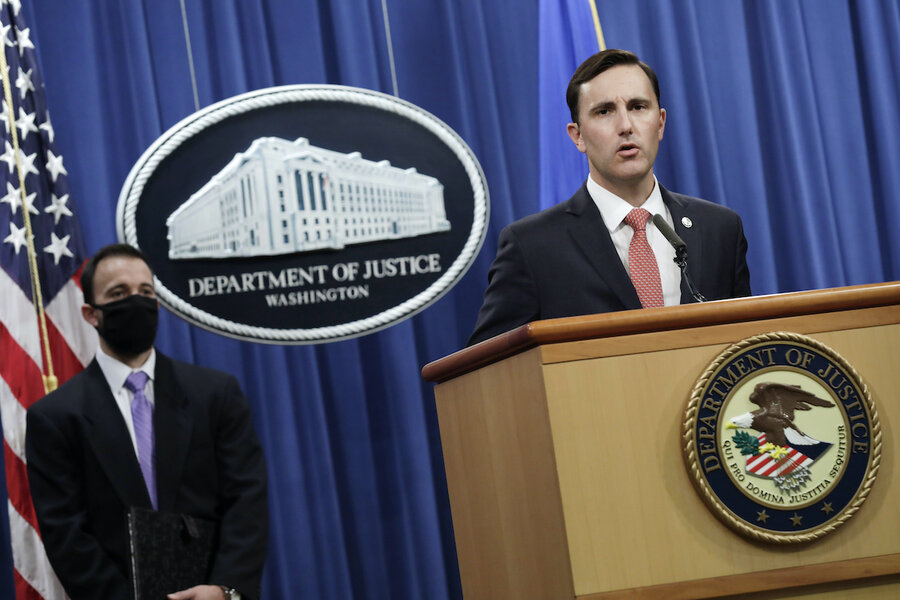Goldman Sachs unit pleads guilty in Malaysian corruption scandal
Loading...
| Washington
A subsidiary of Goldman Sachs pleaded guilty on Thursday and agreed to pay more than $2.9 billion in a foreign corruption probe tied to the Malaysian 1MDB sovereign wealth fund, which was looted of billions of dollars in a corruption scandal.
In addition, several current and former top executives at Goldman will have to return millions of dollars in pay and bonuses to the company, a financial penalty for those in charge when the scandal unfolded.
Goldman Sachs Malaysia entered the plea in federal court in Brooklyn. As part of its plea, the company admitted that it “knowingly and willfully” conspired to violate U.S. anti-bribery laws.
The $2.9 billion includes payments to regulators in the United States and overseas. The penalties also include roughly $600 million in profits Goldman made off the 1MDB scandal that it will have to disgorge. Goldman had previously reached a $3.9 billion settlement with the government of Malaysia.
Goldman Sachs’ board of directors decided to claw back pay and bonuses from top executives, including current CEO David Solomon and former CEO Lloyd Blankfein. The firm is in talks with additional executives to return part of their pay to the company over their role in the scheme. In total, more than $174 million in pay and bonuses are being returned to the company, the board said.
“The Board views the 1MDB matter as an institutional failure, inconsistent with the high expectations it has for the firm,” Goldman’s board said in a separate statement.
Malaysian and U.S. prosecutors had alleged that bond sales organized by Goldman Sachs provided one of the means for associates of former Prime Minister Najib Razak to steal billions over several years from a fund that was ostensibly set up to accelerate Malaysia’s economic development.
“Goldman Sachs participated in a sweeping international corruption scheme, conspiring to avail itself of more than $1.6 billion in bribes to multiple high-level government officials across several countries so that the company could reap hundreds of millions of dollars in fees, all to the detriment of the people of Malaysia and the reputation of American financial institutions operating abroad,” said Acting U.S. Attorney Seth DuCharme of the Eastern District of New York, in prepared remarks.
In court on Thursday, Goldman Sachs’ general counsel, Karen Seymour, said that agents and employees of Goldman Sachs Malaysia had violated the U.S. Foreign Corrupt Practices Act by “corruptly promising and paying bribes to foreign officials in order to obtain and retain business for Goldman Sachs.”
The fund, 1Malaysia Development Berhad, was set up in 2009 by Mr. Najib to promote economic development. It relied primarily on debt to fund investment and economic development projects and was overseen by senior Malaysian government officials, according to court records.
Mr. Najib set up 1MDB when he took office in 2009, but it accumulated billions in debts, and U.S. investigators allege at least $4.5 billion was stolen from the fund and laundered by his associates.
Public anger over the corruption allegations contributed to the shocking election defeat of Mr. Najib’s long-ruling coalition in May 2018.
Two Goldman Sachs executives have also been personally charged for fraud. Tim Leissner, who was the chairman of Goldman’s Southeast Asia division, pleaded guilty to money laundering and violating the Foreign Corrupt Practices Act. Another Goldman executive, Ng Chong Hwa also known as “Roger Ng,” will stand trial for money laundering and violating the FCPA in March 2021.
“While it is abundantly clear that certain former employees broke the law, lied to our colleagues, and circumvented firm controls, this fact does not relieve me or anyone else at the firm of our responsibility to recognize two critical realities,” Mr. Solomon said in a statement.
The Department of Justice bought similar charges against Low Taek Jho, a Malaysian national with close relations to the then Malaysian ruling party who was the central player in the 1MDB fund. Mr. Low lived a lavish lifestyle in New York, buying luxury goods and even a yacht. Mr. Low’s whereabouts are unknown, although he’s believed to be somewhere in China and out of the reach of international authorities.
This story was reported by The Associated Press.







